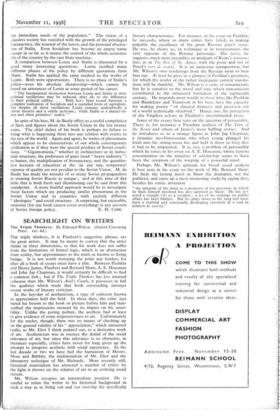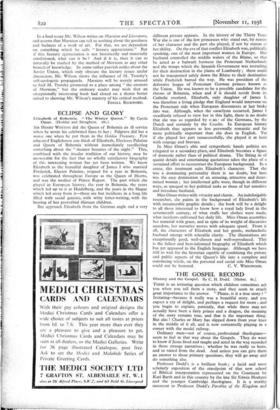SEARCHLIGHT ON WRITERS
THE triple thinkers, it is Flaubert's suggestive phrase, are the great artists. It may be meant to convey that the artist thinks in three dimensions, so that his work does not suffer from the limitations of formal logic, which is an abstraction from reality, but approximates to the truth as known to living beings. It is not worth worrying the point any further, for after all a book of essays must have a title. Between Pushkin and Henry James, Flaubert and Bernard Shaw, A. E. Housman and John Jay Chapman, it would certainly be difficult to find a common link ; but if The Triple Thinkers has less internal cohesion than Mr. Wilson's Axel's Castle, it possesses in full the qualities which made that book outstanding amongst recent works of literary criticism.
In the hey-day of aestheticism, a type of criticism known as appreciation held the field. In those days, the critic just bared his bosom to the book or picture before him and tran- scribed the impressions aroused by its impact on his sensi- bility. Unlike the poring pedant, the aesthete had at least to give evidence of some responsiveness to art. Unfortunately for the reader, though, there was no means of checking up on the general validity of his "appreciation," which amounted really, as Mr. Eliot I think pointed out, to a derivative work of art. Aestheticism was in essence the denial of the social relevance of art, but since this relevance is so obtrusive, in literature especially, critics have never for long given up the attempt to integrate aesthetic with social experience. In the last decade or two we have had the humanism of Messrs. More and Babbitt, the traditionalism of Mr. Eliot and the laboratory technique of Mr. Richards. More recently still, historical materialism has attracted a number of critics by the light it throws on the relation of art to an evolving social system.
Mr. Wilson occupies an intermediate position. He is careful to relate the writer to his historical background in such a" way as to bring out and not over-lay his specifically literary characteristics. For instance, in his essay on Pushkin, he succeeds, where so many critics have failed, in making palpable the excellence of the great Russian poet's verse. He was, he shows us, in technique as in temperament, the very opposite of the Byronic personage. His verse, he suggests, much more resembles an amalgam of Keats's sensuous line, as in The Eve of St. Agnes, with the poise and wit of Praed's vers de societe. It is an audacious juxtaposition, but Mr. Wilson's own renderings from the Russian seem to bear him out. At least he gives us a glimpse of Pushkin's greatness, for which the reader of the rather inadequate current transla- tions will be thankful. Mr. Wilson is a critic of romanticism, but he is sensitive to the mood and tone which romanticism contributed to the exhausted formalism of the eighteenth century. He responds most readily to those who, like Pushkin and Baudelaire and Tennyson at his best, have the capacity for making poetry "of classical firmness and precision out of a world realistically observed." Hence, too, his perception of the Virgilian echoes in Flaubert's unsentimental prose.
Some of the essays here turn on`the question of personality.
There is, for instance, -a Freudian analysis of The Turn of the Screw and others of James's more baffling stories. And he introduces us to a strange figure in John Jay Chapman, a. dynamic neo-Emersonian who when young plunged his hand into his sitting-room fire and held it there so long that it had to be amputated. It is, too, a-problem of personality which he raises in his essay on A. E. Housman, whose furious concentration on the minutiae of scholarship seems to have been the symptom of the warping of a powerful mind.
Perhaps Mr. Wilson's aptitude for broad social analysis is best seen in his essay on the work of Mr. Bernard Shaw.
He finds the lasting merit in Shaw the dramatist, not the publicist, and sums up a most interesting study by saying that, besides his comic invention
"the integrity of the artist as a projector of the processes in which he finds himself involved has also survived in Shaw. He has no: acted a straight role as a socialist ; a lot of his writings on public affairs has been blather. But his plays down to the very end have been a truthful and continually developing chronicle of a soul in relation to society." In a final essay Mr. Wilson writes on Marxism and Literature, and asserts that Marxism can tell us nothing about the goodness and badness of a work of art. For that, we are dependent on something which he calls "literary appreciation." But if this literary appreciation is not historically and materially conditioned, what can it be? And if it is, then it can as naturally be studied by the method of Marxism as any other branch of knowledge. In some rather peevish asides about the Soviet Union, which only obscure the literary issues under discussion, Mr. Wilson shows the influence of M. Trotsky's self-apologetic propaganda. Marxists will be merely amused to find M. Trotsky promoted to a place among "the creators of Marxism," but the ordinary reader may wish that an exceptionally interesting book had closed on a theme better suited to showing Mr. Wilson's mastery of his critical method.
EDGELL RICICWORD.











































 Previous page
Previous page